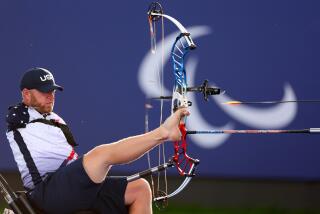U. S. OLYMPIC FESTIVAL : Nygord Thinks About Another 1st-Place Finish : Shooting: Two-time Olympian, 55, combats the stress of competition by employing visual imagery.
- Share via
On the front lawn of Don Nygord’s house in La Crescenta stands one of those security-protection markers that warns would-be intruders of an “armed response” in big, bold letters.
It is doubtful that anyone would try to break into Nygord’s house, however, if they knew just who it was that lived there.
A two-time U. S. Olympian in pistol shooting, Nygord can hit a bull’s-eye less than two inches in diameter from a distance of 50 meters, or nail one the size of an aspirin tablet from 10 meters nine times out of 10.
But the shots didn’t always ring true for Nygord, 55, who will compete in the free pistol (.22-caliber at 50 meters) and air pistol (pellet gun at 10 meters) events in the U. S. Olympic Festival at Prado Tiro Olympic Shooting Park in Chino on Saturday and Sunday.
Back in 1960, Nygord boasted to his Air Force buddies that he could shoot bottle caps off the tops of rocks from incredible distances but then failed miserably when it was time to deliver.
After the bottle-cap disaster, Nygord began shooting on a regular basis--winning the American-style title at the national civilian championships in Camp Perry, Ohio, in 1966. In American-style competition, contestants must use three different caliber hand guns. They are also given more time to shoot and targets are larger than in free- and air-pistol events.
That was the height of his ambition at the time, however, and he did not become interested in the styles of shooting used in the Olympic Games until 1977.
In order to devote more time to training and competing, he quit his corporate-level job with an aerospace company in 1978 and founded Nygord Precision Products--which imports upper-level target-shooting equipment--with his wife Donna.
The sacrifices paid off as he placed third in the air pistol event in the national championships in Phoenix and qualified for his first U. S. team.
“I really shocked myself,” Nygord said. “I had no idea I was going to finish that high.”
Nygord continued to improve the next year, winning the air pistol event at the national championships and in the Pan American Games.
In 1980, he was an alternate on the Olympic team that was barred from the Moscow Summer Games under then-President Jimmy Carter’s boycott protesting the Soviet invasion of Afghanistan, and, in 1981, he won the air pistol title in the World Championships in Santo Domingo in the Dominican Republic.
“That was particularly satisfying because it was one of those events where all the European countries--including the Russians--were there,” said Nygord, who was born in Pocatello, Ida., and raised in Baker, Ore. “It wasn’t one of those abbreviated events which was called the World Championships, but (it lacked quality) in terms of who was there.”
Nygord lists the world title as his greatest shooting accomplishment and his performance in the 1985 Championships of the Americas at Ft. Benning, Ga., a close second. He won seven of eight events at the military base and finished second in the other.
The Olympics were not nearly as kind to Nygord. He placed 12th in the free pistol event in 1984 in Los Angeles--the air pistol was not yet an Olympic event--and finished ninth in the free pistol and in the mid-30s in the air pistol in the ’88 Games in Seoul.
He nearly called it quits after that but decided he wasn’t too old for the sport yet.
“I had no idea I was going to keep it up this long,” Nygord said. “In fact, I was going to retire after the 1988 Olympics, but I just couldn’t do it.”
Nygord’s longevity is attributable in part to the fact that he didn’t become seriously involved in the sport until his early 40s.
“Shooting is not like a lot of other sports where age is a huge factor,” Nygord said. “You do lose a little physical ability as you get older, but you can make up for it with your mind.”
So, for Nygord, the sport became a thinking man’s game. He worked on his marksmanship by practicing two forms of mental imagery, strategic and tactical.
In the first instance, he visualizes himself performing well in the heat of competition; in the second, he visualizes the execution of the shot, starting with the preparation, then taking the shot and following through on it.
“It’s all very important,” Nygord said. “Ninety percent of this sport is mental and 10% is physical.”
This does not mean that there is no physical training involved or, as Nygord quipped, “The NRA does not stand for Not Really Athletes.”
But most of the training involves conditioning--specifically, the arm and shoulder muscles in pistol shooting--to help the shooter relax and remain still at the same time.
“You’re never perfectly still,” Nygord said. “But your body does have a rhythm or a pattern to it. You have to get to know that rhythm so that you can shoot when your body is as still as possible.”
That might sound simple, but an unconditioned person can hold an arm straight out for only a few seconds before the body begins to waver. And when a two-pound gun is placed in the hand, the task becomes even more difficult.
Do that 60 times over 2 1/2 hours, then try to hit the aforementioned bull’s-eyes from either 50 (free pistol) or 10 (air pistol) meters.
Keeping a steady hand can really become a test of will when the shooters with the top eight scores after 60 shots are pitted against one another in a final round. Each marksman then takes 10 shots--one each during a 75-second time period--and a point tally of each individual competitor is updated after each shot.
“That is a very stressful situation,” Nygord said. “I liken that to running a marathon, then running a bunch of sprints to determine the winner.”
The final-round shootout began in 1986 in an effort to increase spectator interest, and although some athletes weren’t thrilled with it at first, it has become an accepted part of the competition.
“It does make for an exciting finish,” Nygord said. “Shooting is a curious sport because you have no idea what the other guys are doing during the first part of the competition. You’re just focused on your own performance. But in the finals, you know what the other guys are doing. And that can either help or hinder you.”
Although Nygord traditionally has competed well in the final round--frequently moving up a place or two in the standings--he has found that his average score in the final 10 shots is invariably lower than in the previous 60.
“I’m still trying to master that aspect of it, so that there is no drop,” Nygord said.
With no intention of retiring, Nygord will have plenty of time to try.
More to Read
Go beyond the scoreboard
Get the latest on L.A.'s teams in the daily Sports Report newsletter.
You may occasionally receive promotional content from the Los Angeles Times.






